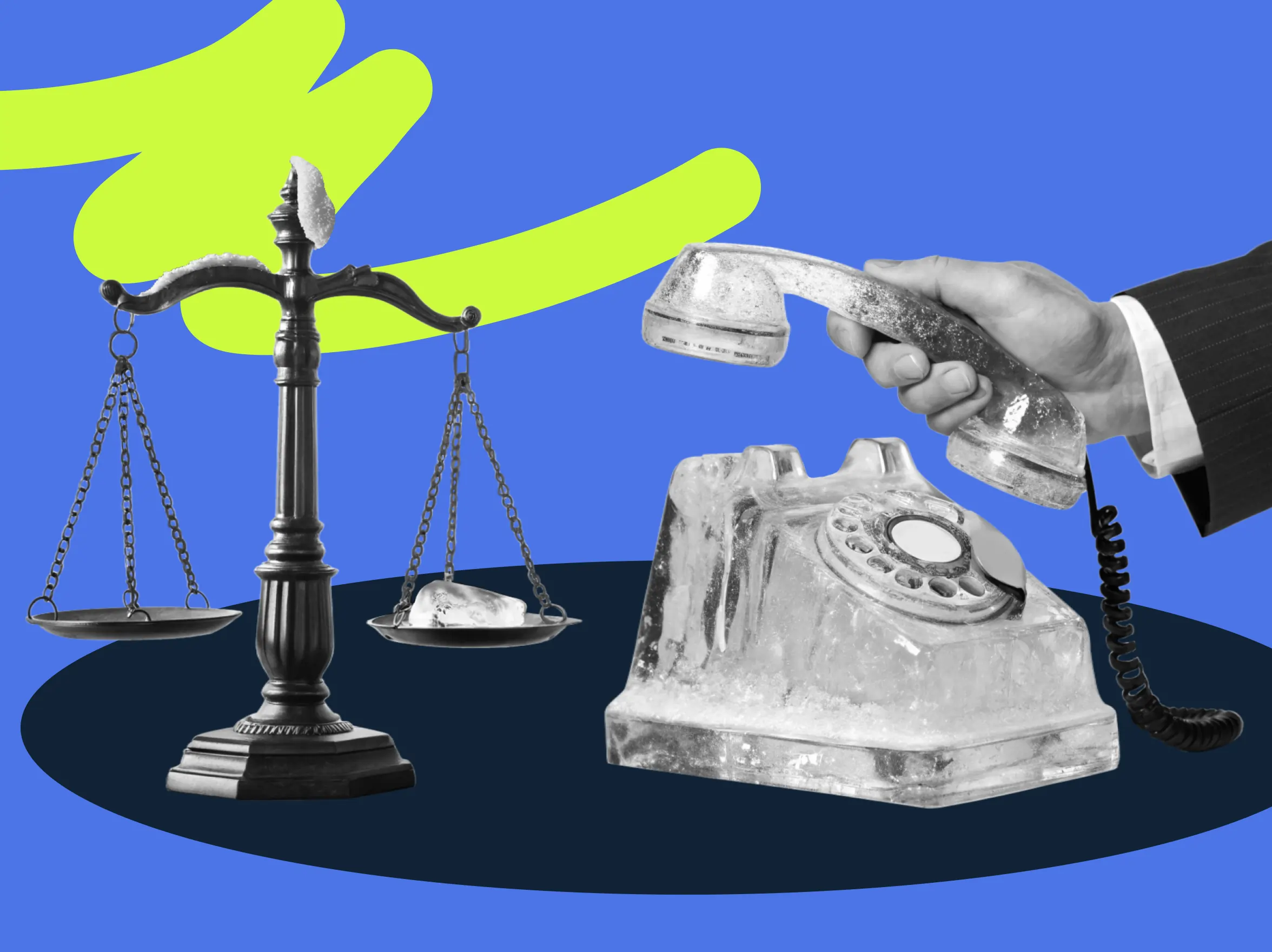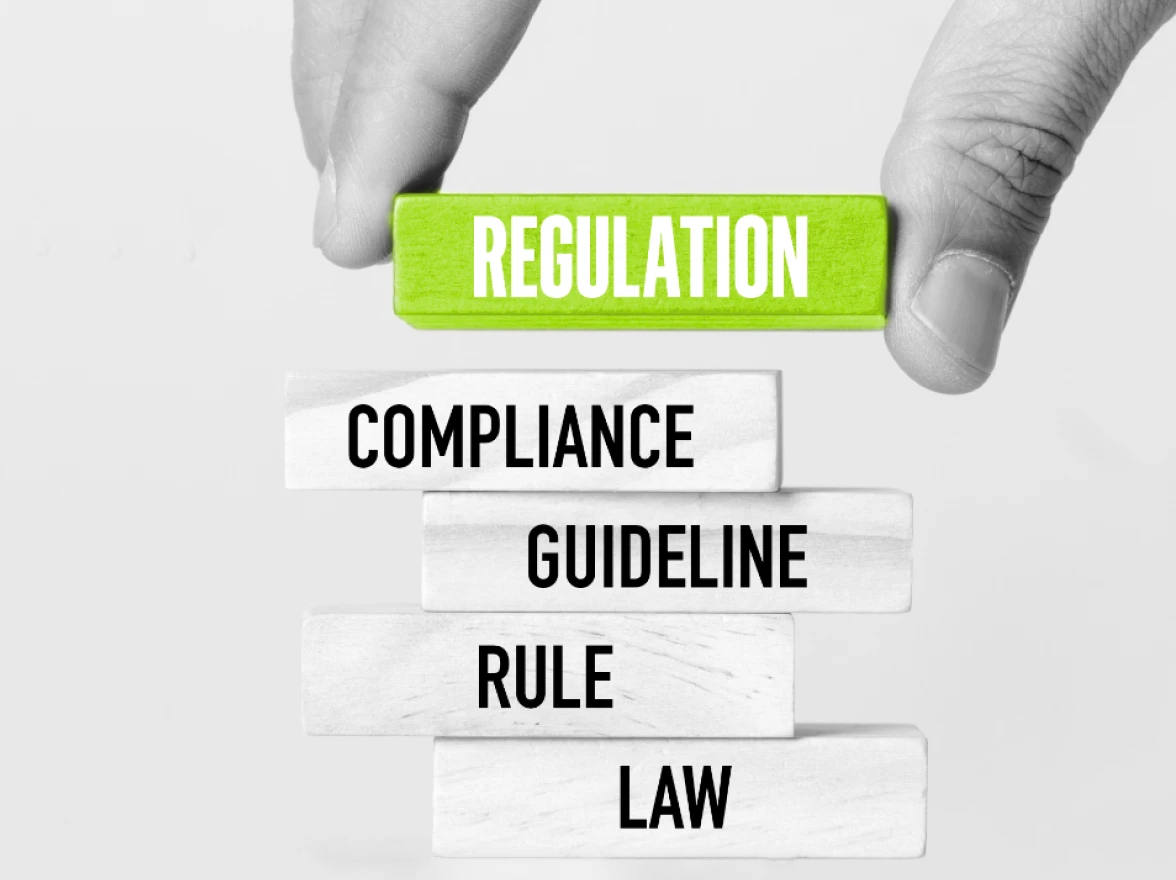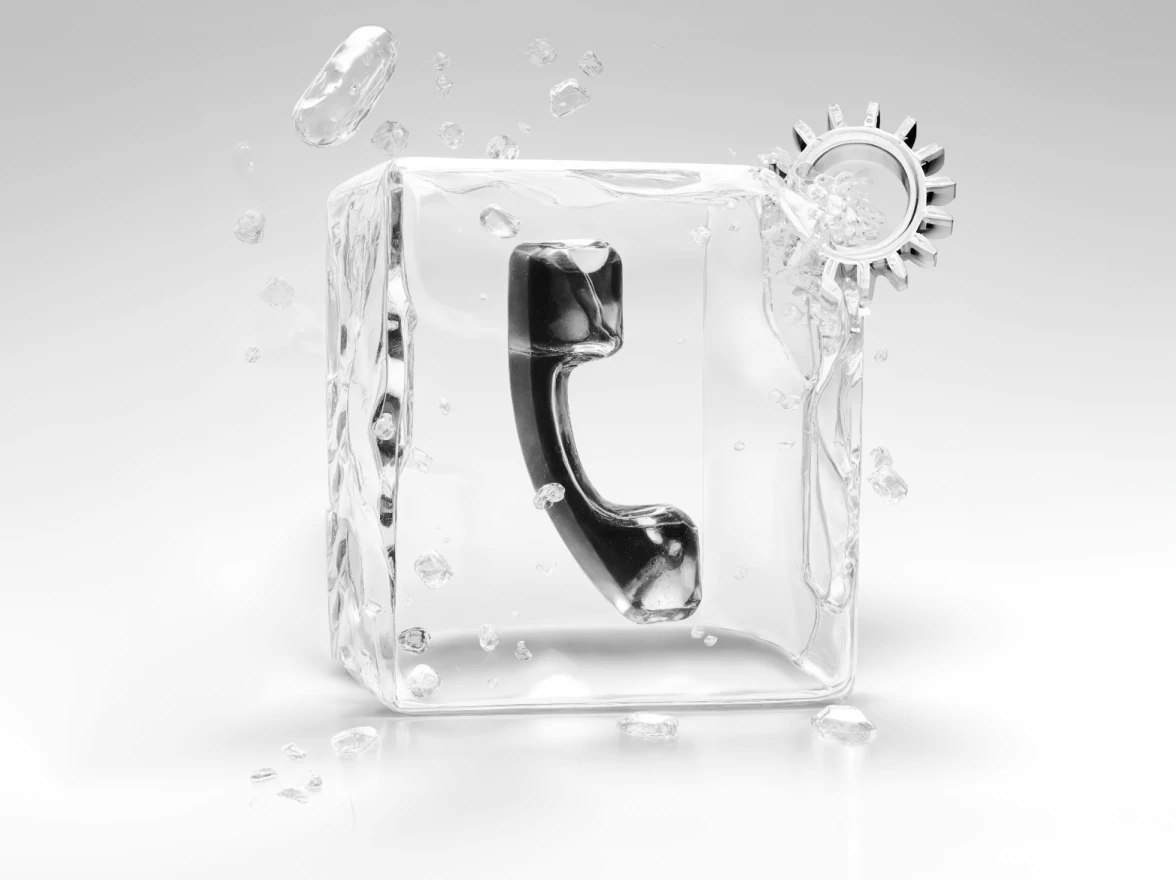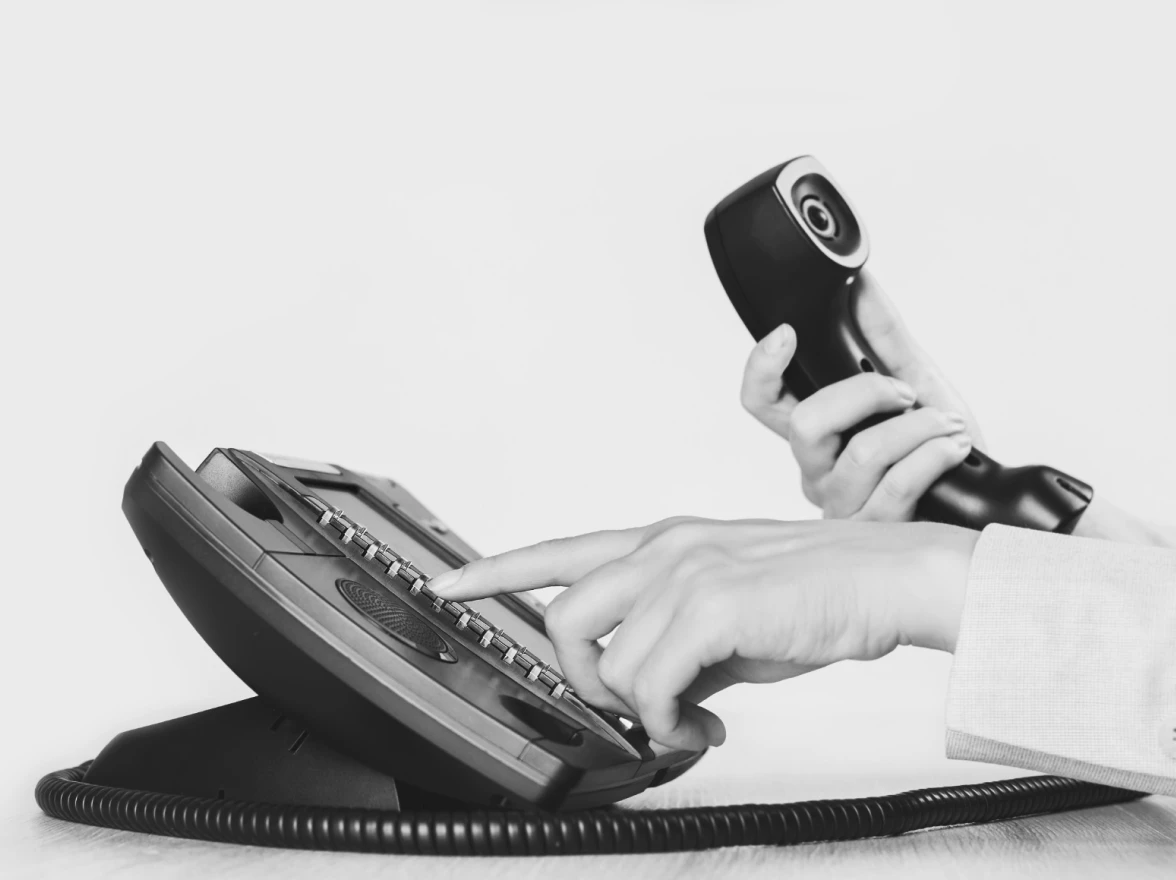The Telephone Consumer Protection Act defines telemarketing, commonly known as cold calling, as “initiation of a telephone call or message for the purpose of encouraging the purchase or rental of, or investment in, property, goods, or services.”
This is a legal practice, but cold calling requires marketers to adhere to certain rules, regulations, and measures. Otherwise, they could end up partaking in illegal actions, which could result in fines or even jail time.
Cold calling: a history
Telemarketing was once commonplace, and was even, before the Internet, a primary way that sellers engaged with potential clients. In 1980, more than 90 percent of all households had a landline phone. Reaching people was practically guaranteed (if they were home) and easy.
But it might have been too easy. Calls increased so much that the federal government was forced to intervene with one of the early cold calling regulations, the Telemarketing Sales Rule. This restricted deceptive or obnoxious practices. Now, less than a quarter of households have landlines and, with the advent of cell phones, customers’ tastes have changed when it comes to how they want to be contacted. As a result, unwanted calls became sharply less popular, leading the federal government to take a series of steps to crack down on them even more.
Cold calling laws and regulations in the USA
The Telephone Consumer Protection Act (TCPA)
As mentioned above, the Telephone Consumer Protection Act is a foundational piece of legislation. It is a cornerstone of all the legal requirements of cold calling that have followed it. Passed in 1991 and signed by President George H. W. Bush, the act defined what telemarketing was and did many other things:
- Ban on Certain Automated Calls: It is illegal to use cold calling dialers or a prerecorded voice messages to call emergency lines, hospital rooms, or any number where the recipient may be charged without consent. That means AI calling is illegal in this case, too.
- Prohibition on Unsolicited Fax Ads: The law bans sending unsolicited advertisements to fax machines using any device, including computers or fax machines.
- Time Restrictions: The law states that calls cannot be made before 8:00 AM or after 9:00 PM local time.
- Identification in Prerecorded Messages: All prerecorded calls must state the caller’s identity at the beginning and provide a phone number or address during or after the message.
- Line Release Requirement: Once a prerecorded message is left on an individual’s voicemail, the call must be ended within five seconds.
- Private Right to Sue: Consumers can sue violators if the violation was knowing or willful.
Some other aspects—such as rules relating to fax machines—do not relate heavily to today. However, some penalties, such as the private right to sue, still exist. While the law stated that damages could go up to $1,500.
Telemarketing Sales Rule (TSR)
Coming a few years later, the Federal Trade Commission used the previous law to enact more regulations: the Telemarketing Sales Rule, which is in reality a series of rules rendering certain practices Illegal:
- Prohibition on Deceptive Practices: It is unlawful for sellers to misrepresent material information, such as the total cost, nature of goods or services, or refund policies, before a customer agrees to a purchase.
- Express Verifiable Authorization for Payments: Before processing payments, sellers must obtain express verifiable authorization from the customer, which includes clear disclosures about the transaction details and is evidenced by written or recorded consent.
- Time-of-Day Restrictions: Telemarketers are prohibited from initiating outbound calls to a person’s residence before 8:00 a.m. or after 9:00 p.m. local time at the called person’s location without prior consent.
- Required Oral Disclosures: Agents must truthfully and clearly disclose the seller’s identity, the purpose of the call, the nature of the goods or services, and any material terms, such as no-purchase-necessary conditions in prize promotions.
However, there are some exemptions, such as those initiated by a customer or donor in response to an advertisement. The FTC can punish violators for not adhering to the TSR—and currently, the maximum penalty stands at over $53,000.
Do Not Call Registry
Following the Do Not Call Registry (DNC) is key to keeping your cold calling in compliance, as it is one of the most straightforward rules: if someone puts their number on the list, you cannot call them. It is a fundamental rule and built on the TSR:
- Authorization to Collect Fees: The Federal Trade Commission (FTC) is authorized to collect fees sufficient to implement and enforce the provisions related to the “do-not-call” registry of the Telemarketing Sales Rule.
- Coordination with the Federal Communications Commission (FCC): The FTC and the FCC are directed to coordinate the operation and enforcement of the “do-not-call” registry to maximize consistency between their respective rules.
Individuals or businesses who violate this rule can be hit with over $50,000 per violation. It does not matter how you got someone’s number. If someone put their number on the DNC list, they are not to be contacted.
This is not to say that, for non-telemarketing purposes, you cannot sometimes contact people on the DNC list. Political calls, informational calls, surveys (provided it does not involve a sales pitch), and calls from charitable organizations are mostly exempt from the rules.
Electronic Communications Privacy Act (ECPA)
This is the oldest law on our list. Signed by President Ronald Reagan in 1986, the ECPA protects privacy over electronic communications. An evolution of an older anti-wiretapping law, it extended protections to non-wired services.
- Prohibition on Unauthorized Interception: It is unlawful to intentionally intercept, disclose, or use the contents of any wire, oral, or electronic communication through the use of any electronic, mechanical, or other device, unless authorized by law.
- Data Use: This law also means that if you use phone numbers or other data obtained illegally, such as through hacking or unauthorized data sales, you can be penalized, since the information was gathered in violation of privacy laws.
- Exceptions for Consent: The law permits interception if one of the parties to the communication has given prior consent or if the communication is readily accessible to the general public.
- Stored Communications Act (SCA): The SCA, Title II of the ECPA, governs the voluntary and compelled disclosure of stored wire and electronic communications and transactional records by service providers.
Punishments are not just restricted to fines – you can be imprisoned if you violate this law. It is a hefty penalty, and one you should not take lightly. It also affects telemarketers and cold callers.
State laws
Due to the nature of American governance, each state has significant powers of its own. It’s legal to cold call in all of them, but they all have complex rules for the practice. While things like the national Do Not Call list apply to each state, states, for example, can have their own lists as well, along with other telemarketing restrictions that you need to pay attention to.
For example, states can develop their own do-not-call lists, which are legally separate from the national do-not-call lists. They do not override the national list – they simply add to it:
| State | State-Run Do Not Call List? | State | State-Run Do Not Call List? |
|---|---|---|---|
| Alabama | No (National) |
Montana | No |
| Alaska | Yes | Nebraska | No |
| Arizona | No | Nevada | No |
| Arkansas | No | New Hampshire | No |
| California | No | New Jersey | No |
| Colorado | Yes | New Mexico | No |
| Connecticut | No | New York | No |
| Delaware | No | North Carolina | No |
| Florida | Yes | North Dakota | No |
| Georgia | No | Ohio | No |
| Hawaii | No | Oklahoma | Yes |
| Idaho | No | Oregon | No |
| Illinois | No | Pennsylvania | Yes |
| Indiana | Yes | Rhode Island | No |
| Iowa | No | South Carolina | No |
| Kansas | No | South Dakota | No |
| Kentucky | No | Tennessee | Yes |
| Louisiana | No | Texas | Yes |
| Maine | Yes | Utah | No |
| Maryland | No | Vermont | No |
| Massachusetts | Yes | Virginia | No |
| Michigan | No | Washington | No |
| Minnesota | No | West Virginia | No |
| Mississippi | No | Wisconsin | No |
| Missouri | Yes | Wyoming | Yes |
However, you should keep in mind that many states, like Minnesota, direct and encourage residents to put their numbers on the national list. Other states may add to penalties if violations of the national DNC registry are conducted within their borders.
When you can partake in cold calling is also covered by both federal and state laws. Generally, cold calling is legal in the United States only after 8:00 AM and before 9:00 PM – but some state laws go further (for example, it is illegal to cold call in Kentucky before 10:00 AM). Before you start calling numbers out of the phone book, take a gander below:
| State | Permissible Calling Times (Local Time) | State | Permissible Calling Times (Local Time) |
|---|---|---|---|
| Alabama | 8 AM – 8 PM | Montana | 8 AM – 9 PM |
| Alaska | 8 AM – 9 PM | Nebraska | 8 AM – 9 PM |
| Arizona | 9 AM – 8 PM | Nevada | 9 AM – 8 PM |
| Arkansas | 8 AM – 8 PM | New Hampshire | 8 AM – 9 PM |
| California | 8 AM – 9 PM | New Jersey | 8 AM – 9 PM |
| Colorado | 8 AM – 8 PM | New Mexico | 9 AM – 9 PM |
| Connecticut | 9 AM – 9 PM | New York | 8 AM – 9 PM |
| Delaware | 8 AM – 9 PM | North Carolina | 8 AM – 9 PM |
| Florida | 8 AM – 8 PM | North Dakota | 8 AM – 9 PM |
| Georgia | 8 AM – 9 PM | Ohio | 8 AM – 9 PM |
| Hawaii | 8 AM -9 PM | Oklahoma | 8 AM – 8 PM |
| Idaho | 8 AM – 9 PM | Oregon | 8 AM – 9 PM |
| Illinois | 8 AM – 9 PM | Pennsylvania | 8 AM – 9 PM |
| Indiana | 8 AM – 9 PM | Rhode Island | 9 AM – 6 PM |
| Iowa | 8 AM – 9 PM | South Carolina | 8 AM – 8 PM |
| Kansas | 8 AM – 9 PM | South Dakota | 8 AM – 9 PM |
| Kentucky | 10 AM – 9 PM | Tennessee | 8 AM – 9 PM |
| Louisiana | 8 AM – 8 PM | Texas | 9 AM – 9 PM |
| Maine | 8 AM – 9 PM | Utah | 8 AM – 9 PM |
| Maryland | 9 AM – 8 PM | Vermont | 8 AM – 9 PM |
| Massachusetts | 8 AM – 9 PM | Virginia | 8 AM – 9 PM |
| Michigan | 9 AM – 9 PM | Washington | 8 AM – 8 PM |
| Minnesota | 9 AM – 9 PM | West Virginia | 8 AM – 9 PM |
| Mississippi | 8 AM – 8 PM | Wisconsin | 8 AM – 9 PM |
| Missouri | 8 AM – 9 PM | Wyoming | 8 AM – 9 PM |
There are, of course, a variety of other calling-related subjects covered by state law, such as when you can record calls. Some states require both (or all) participants of a call to provide consent for the call to be recorded:
- California
- Colorado
- Connecticut
- Delaware
- Florida
- Illinois
- Maryland
- Massachusetts
- Michigan
- Montana
- New Hampshire
- New Jersey
- Pennsylvania
- Rhode Island
- Washington
However, please note that state laws are subject to frequent changes. Plus, some laws, like Delaware’s, are somewhat vague on execution. To make sure you don’t accidentally break a rule – and therefore cause yourself legal issues – you can use things like MightyCall’s call recording feature, which automatically notifies the people you are speaking with that they are being recorded.
There are other state-based restrictions; for example, no state allows you to call before 8:00 AM (Kentucky makes you wait until at least 10:00 AM) to make law-compliant cold calls.
Is cold calling legal around the world?
In many countries, cold calling is a legitimate way to conduct business. Read below to find out many of the key rules around the world:
Canada: Canadian Radio-television and Communications Commission Rules (CRTC)
The first of our international cold call rules, the CRTC rules are a legal framework that stems from the Communications Act of 1991, which lets the government regulate telecommunications. While they have wide purview, we’ll focus on their Unsolicited Telecommunications Rules:
- External (National) Do Not Call: All telemarketers in Canada must register and subscribe to the national Do Not Call list.
- Internal Do Not Call: Companies must also keep internal track of individuals who say they do not wish to be called.
- Call times: Telemarketing calls can only be made between 9:00 a.m. and 9:30 p.m. on weekdays and between 10:00 a.m. and 6:00 p.m. on weekends.
- Robocalls: Can only be undertaken with prior consent. Charities are not
Companies can be fined $15,000 Canadian dollars per call.
Europe: General Data Protection Regulation (GDPR)
The General Data Protection Regulation was put into effect in 2018, and supersedes national cold calling regulations of European Union member states when it comes to data privacy:
- Lawful Processing: Data must be processed legally, fairly, and transparently.
- Purpose Limitation: Use data only for specified, legitimate purposes.
- Data Minimization: Collect only what’s necessary.
- Accuracy: Keep data accurate and up to date.
- Storage Limitation: Don’t retain data longer than needed.
- Security: Ensure protection against unauthorized access or loss.
- Accountability: Controllers must demonstrate GDPR compliance.
- Individual Rights: Includes access, correction, erasure, portability, objection, and limits on automated decisions.
Fines can be really heavy. Severe violators can face up to €20 million, or 4% of annual global turnover (whichever is higher). A lesser violation can still cost up to €10 million or 2% of annual global turnover.
United Kingdom: Privacy and Electronic Communications Regulations (PECR)
Cold calls are legal in the United Kingdom, provided you follow the PECRs: a set of laws providing specific rules on privacy and electronic communications, including marketing, cookies, and security of communications services. They govern the entirety of the United Kingdom, not just England.
- Marketing Communications: Requires prior consent for unsolicited marketing calls, emails, texts, and faxes.
- Cookies and Similar Technologies: Mandates user consent for storing or accessing user device information.
- Security of Communications Services: Obligates providers to ensure the security of their services and notify users of certain types of breaches.
- Traffic and Location Data: Regulates the use of traffic and location data, itemised billing, and line identification.
- Directory Listings: Sets rules for the inclusion of individuals and corporate bodies in public directories.
Penalties can reach up to £500,000 – this includes sending unsolicited marketing messages without consent.
Germany: Unfair Competition Law (UWG)
The UWG is a German cold calling law that protects consumers from false advertising and other malicious practices.
- Misleading Advertising: Prohibits false or deceptive advertising that could mislead consumers.
- Aggressive Commercial Practices: Bans practices that coerce or unduly pressure consumers into decisions.
- Unsolicited Marketing: Restricts unsolicited advertising, especially via telephone, fax, or email, without prior consent.
- Influencer Transparency: Mandates that influencers disclose paid promotions or gifts in their posts.
- Consumer Protection: Grants consumers the right to claim damages if misled into transactions they wouldn’t have otherwise made.
- Digital Practices: Addresses unfair practices in digital platforms, including fake reviews and misleading online content.
The fines for this law are a bit smaller than the others, coming in at €300,000 per violation. But serious violations can result in jail time of up to two years. Remember that Germany is a federal republic, meaning that each separate region may have their own consumer protection laws.
Australia: Australian Consumer Law (ACL)
The Australian Consumer Law establishes the legality of cold calling and is similar to Germany’s legislation.
- Unfair Contract Terms: Protect consumers from unfair terms in standard form contracts.
- Misleading or Deceptive Conduct: Prohibit businesses from engaging in conduct that is misleading or likely to mislead consumers.
- Unconscionable Conduct: Prevent businesses from engaging in conduct that is harsh or oppressive.
- Product Safety: Mandate that products meet safety standards and require businesses to report product-related injuries or deaths.
- Unsolicited Consumer Agreements: Regulate door-to-door and telephone sales to protect consumers from high-pressure sales tactics.
Keep in mind that Australia, like Germany, gives its regions strong powers of their own – so be on the lookout for state and territorial laws.
Brazil: Consumer Defense Code (CDC)
The CDC is Brazil’s answer to consumer protections. While it is a broad-based law, two particular aspects relate to cold call law:
- Unsolicited Telemarketing: The CDC specifically addresses issues related to unsolicited marketing practices, including telemarketing. These kinds of cold calls are illegal. The law requires businesses to obtain consent before contacting consumers for marketing purposes, ensuring that telemarketing calls are not intrusive or deceptive.
- Right to Opt-Out: Consumers have the right to request not to be contacted by telemarketers. There are also platforms, like “Não Me Perturbe,” that help consumers opt out of telemarketing calls.
If you violate the CDC, you can lose your business outright by losing your business license. Plus, fines vary. Some are rather small – roughly only $75 USD – but some are higher, up to around $1.7 million USD.
India: Telecom Commercial Communications Customer Preference Regulations (TCCCPR)
The last of our international cold calling regulations, the TCCCPR – admittedly a mouthful – regulates unsolicited commercial communications such as telemarketing calls and messages.
- National Customer Preference Register (NCPR): Like the American Do Not Call List, consumers can register on the NCPR to block or receive specific types of communications.
- Sender Registration: Telemarketers must register with TRAI and follow specific guidelines for message categorization (e.g., promotional or transactional).
- Complaint Mechanism: Consumers can file complaints about unsolicited communications, and service providers are required to address these issues.
Fines start as low as around $1,200 USD but can get up to $12,000 for repeat violations.
Are cold calling rules different for B2B and B2C?
But what if you are not calling people? Is it compliant to cold call businesses? This is usually looser, but can still result in illegal cold calling if not done correctly.
| Law | Business to Business (B2B) | Business to Consumer (B2C) |
|---|---|---|
| TCPA (Telephone Consumer Protection Act – US) | Not directly applicable: Primarily applies to consumer telemarketing | Applies: Strict rules for telemarketing calls, including robocalls, unsolicited faxes, and prerecorded messages |
| TSR (Telemarketing Sales Rule – US) | Not applicable: Primarily focused on consumer protection | Applies: Sets rules for telemarketers, including do-not-call lists, disclosure requirements, and calling hours |
| DNC (Do Not Call – US) | Not directly applicable: B2B calls are generally not regulated under DNC | Applies: Businesses must respect Do Not Call list preferences; fines for violations |
| GDPR (General Data Protection Regulation – EU) | Applies: B2B data processing must adhere to GDPR, including consent and data protection for employees (as data subjects) | Applies: Comprehensive rules for obtaining consent and protecting personal data, including opt-out and right to be forgotten |
| PECR (Privacy and Electronic Communications Regulations – UK) | Not as strict: B2B marketing via email or calls is less restricted but still must comply with certain regulations, e.g., opt-out requirements | Applies: Requires consent for direct marketing via electronic communication (email, SMS, etc.), and provides opt-out mechanisms |
| UWG (Unfair Competition Law – Germany) | Applies: Prohibits unfair competition in B2B, such as misleading advertising or aggressive sales practices | Applies: Restricts misleading, aggressive marketing, and unethical practices. Covers unfair advertising and unsolicited marketing communications |
Now, you may be reading the various “This does not apply” sections and think that the rules for B2B calling are set. But you would not be entirely correct. The B2B cold calling rules are not as strict, but the B2C cold calling rules still apply. That means if you call someone at their place of business, but you are calling their private number, you could still be liable. Likewise, if someone runs their business with their personal number instead of a business number, you may not be able to contact them.
How can I find out about the legality of cold calling in my area?
Cold calling laws vary from area to area. But before you pick up the telephone, make sure to find out if telemarketing is legal in your area. Fortunately, this is relatively easy. Here are some people you can contact:
- Public Utility Commission: These local commissions can oftentimes help
- Local/regional websites: Your local government – be it a township or city council – will likely have resources on demand that can help you understand any local regulations.
- A lawyer: Talk to a specialist! Law firms are often staffed with people who know the ins and outs of local laws.
- Industry associations: Telemarketing industry associations, like the American Teleservices Association (or other telemarketing associations), can help increase your call center compliance when picking up the telephone.
Rules for legal cold calling strategy
1. Be sure to identify yourself
Rule: Clearly state your business name and the purpose of your call at the beginning.
Why It’s Important: This rule is essential for compliance with the Telemarketing Sales Rule (TSR) and TCPA. Cold calling is illegal when you fail to identify the name of the business. Plus, it builds trust and transparency, making your call more professional.
Practical Advice: Always introduce yourself within the first few seconds of the call. For example: “Hello, this is [Your Name] from [Business Name], and I’m calling to discuss [Service/Product].” This allows the person to know right away who they’re speaking with and what the call is about, reducing the chances of them hanging up or filing a complaint. Also, consider outbound caller ID.
2. Call during authorized times
Rule: Make calls only during permitted hours, typically between 8 AM and 9 PM (local time of the recipient).
Why It’s Important: Calling outside of these hours can lead to consumer complaints and violations of Do Not Call (DNC) rules. The FCC and FTC have strict rules on telemarketing hours.
Practical Advice: Use your phone system (for example, MightyCall) to ensure your calls are made only during legal hours. This is especially helpful when calling across multiple time zones.
3. Respect Do Not Call (DNC) Registries
Rule: Scrub your calling lists against the National Do Not Call Registry and any state-specific DNC lists.
Why It’s Important: The National DNC Registry allows individuals to opt out of unsolicited marketing calls. Calling someone on the registry could result in hefty fines.
Practical Advice: Use a service or software (like MightyCall’s) that automatically checks and updates your calling lists against the DNC lists to ensure compliance. Keep records of your compliance efforts in case of audits or disputes.
4. Use clear and accurate message scripts
Rule: Your cold calling business should endeavor to be truthful, should not pressure the folks you’re calling, and should fully disclose all relevant information.
Why It’s Important: Misleading claims or failure to disclose key facts can lead to complaints, fines, and legal action. Both the TCPA and TSR cover this.
Practical Advice: Train your agents to use clear language and avoid exaggerations. If offering a product or service, ensure the terms and conditions are stated upfront. You can even script the disclosure of any disclaimers or important conditions related to the offer.
5. Provide an opt-out mechanism
Rule: Always provide an easy and clear way for the recipient to opt out of future calls.
Why It’s Important: Cold calling laws like TCPA and TSR require businesses to allow recipients to remove themselves from your call lists.
Practical Advice: Ensure your representatives know how to process opt-out requests. If using an automated calling system, include an opt-out option (e.g., “Press 9 to be removed from future calls”). Also, document these opt-out requests carefully to ensure you comply with the law. If you use a service like MightyCall, your agents can seamlessly add a number to the Do Not Call list after a call has finished.
6. Keep detailed phone records
Rule: Maintain accurate and detailed records of all cold calls, including the contact information, time of the call, and opt-out requests.
Why It’s Important: Good record-keeping helps demonstrate compliance with telemarketing regulations, especially if a consumer files a complaint or an audit occurs.
Practical Advice: Use a CRM (Customer Relationship Management) tool to log all call details automatically. This system can store call recordings, customer responses, and opt-out requests, ensuring compliance with data retention requirements.
By following these rules, you can ensure that your cold calling software telephone operations stay compliant with legal requirements and maintain a positive reputation with potential customers.
Cold calling laws: complex, but necessary to follow
Is cold calling illegal in the US or elsewhere? No, but navigating the world of cold calling is a complex and difficult process. No matter where you are calling from (or no matter where you’re calling to), you can guarantee that there will be a complex network of regulations you’ll need to follow. But know that, if you follow the rules and use services which make it easier to adhere to them – like MightyCall – your cold calling can be a legal and sound way of running a business.




























